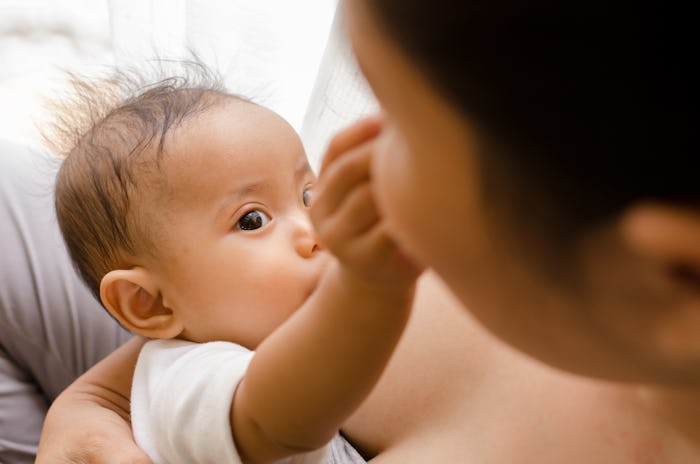The physical and mental health benefits of breastfeeding have long been known, but as researchers continue to delve into the hows and whys they are discovering more about moms' magical milk. For instance, a recent study found that breastfed babies may experience less stress later in life. Genetic changes induced by breastfeeding could make children more capable of managing their stress.
The study, published in the September 2018 edition of the Pediatrics, looked at 40 full-term healthy infants and their mothers. Half of the moms breastfed for the first five months of their children's lives and the other half did not. The team of researchers — led by Barry M. Lester, PhD, director of Women & Infants Hospital's Brown Center for the Study of Children at Risk, a professor of psychiatry and pediatrics at The Warren Alpert Medical School of Brown University, and a member of Care New England Medical Group — looked at the babies' cortisol levels in order to determine their ability to manage stress.
As Lester told Science Daily, the levels differed between breast and formula-fed babies. "What we found is that maternal care changes the activity of a gene in their infants that regulates the infant's physiological response to stress, specifically the release of the hormone cortisol," he said.
Lester went on to explain that differing stress levels between babies were the result of a genetic change, according to the Hindustan Times:
Breastfeeding was associated with decreased DNA methylation and decreased cortisol reactivity in the infants. In other words, there was an epigenetic change in the babies who were breastfed, resulting in reduced stress than those who were not breastfed.
Aside from stress management, breastfeeding has a number of surprising benefits. Breastfeeding also reduces babies' risk of a number of viruses, urinary tract infections, inflammatory bowel disease, gastroenteritis, ear infections, and respiratory infections, according to Parents. Infant-nutrition expert Ruth A. Lawrence, M.D., a professor of pediatrics and OB-GYN at the University of Rochester School of Medicine and Dentistry in Rochester, N.Y., and the author of Breastfeeding: A Guide for the Medical Profession told the outlet that formula-fed babies are three times more likely to experience ear infections and five times more likely to suffer from pneumonia and lower respiratory-tract infections. "The incidences of pneumonia, colds, and viruses are reduced among breastfed babies," she said.
Breastfeeding could also potentially save your child from having to wear braces and glasses down the line, significantly reducing the nerd factor. Mama Natural reported that breastfed babies have improved facial muscle development due to suckling at the breast. Formula-fed babies are more likely to need orthodontic work later in life due to worse jaw alignment. Breast milk may also help prevent tooth decay, leading your child to spend less time in a dentist chair as well. Mama Natural also reported that breastfed babies have superior visual development, particularly in premature infants. The DHA in breast milk is key to retinal development and could explain the difference.
Finally, and perhaps most reassuringly, breastfed babies are at a significantly lower risk of SIDS. A study, published in Pediatrics, looked at eight international studies concerning breastfeeding and SIDS, examining data from more than 2,200 cases of SIDS and 6,800 cases of surviving babies. Researchers involved in the study found that breastfeeding for two to four months reduced the risk of SIDS by 40 percent and breastfeeding for four to six months reduced it by 60 percent, according to USA Today. Breastfeeding beyond six months bumped the reduced risk to 64 percent, while breastfeeding for less than two months offered no protection.
There's no denying that fed is best whether bottle or breast, but only when moms know the full implications of their choices can they make the best decision for themselves and their families. Studies such as these help women to better understand how breastfeeding can be beneficial to their little ones.
